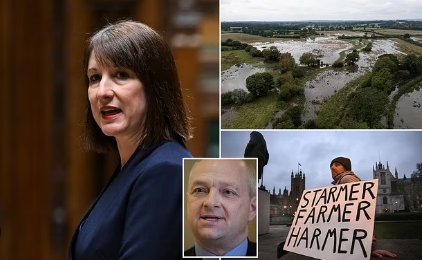Is Rachel Reeves plotting ANOTHER cash raid on farmers? Chancellor warned against taking money from flood defences and nature after IHT hit as she reins in public spending_Nhy
Rachel Reeves has been warned not to target farmers for a second time as she bids to cut costs to see off a potential financial crisis.
The Chancellor is already under fire over Labour‘s plan to hit the wealthiest by making their families pay inheritance tax on the agricultural value of their land.
But fears have been raised that she could hit farmers again this year by making cuts to the Environment Land Management (Elm) scheme.
The scheme pays farmers to make their land nature-friendly and includes cash for flood defences for productive farmland.
It was set up after Brexit to replace the EU Common Agricultural Policy, which subsidised measures including ‘local nature recovery’ habitat creation on farms.
Ms Reeves protected Defra’s £2.4billion allocation for Elms in her Budget last year, but buried in the notes was a warning that it faced ‘significant funding pressures on flood defences and farm schemes of almost £600 million’, signalling they would be reviewed for the 2025-2026 financial year.
Yesterday signalled she may need an emergency Budget as soon as March as soaring Government borrowing costs threatened to derail Labour’s spending plans.
Jerome Mayhew, the Tory MP for Broadland and Fakenham in Norfolk, will lead a debate in Parliament tonight on farmland flooding.
He told MailOnline: ‘There is a real risk that farmers will bear the brunt of future cuts to fix Labour’s mess.

The Chancellor is already under fire over Labour’s plan to hit the wealthiest by making their families pay inheritance tax on the agricultural value of their land.

But fears have been raised that she could hit farmers again this year by making cuts to the Environment Land Management (Elm) scheme. The scheme pays farmers to make their land nature-friendly, and the money includes cash for flood defences for productive farmland.

Jerome Mayhew, the Tory MP for Broadland and Fakenham in Norfolk, will lead a debate in Parliament tonight on farmland flooding.
‘Not content with cutting agricultural property relief, the government seems primed to cut the nature-friendly farming budget after 2026.
‘Cutting this budget would be a fool’s errand for a government supposedly wanting to protect communities from flooding, fight climate change, protect nature, and support British farmers.
‘The government should be figuring out how to raise the nature-friendly farming budget in line with inflation, not punishing farmers further.’
Independent analysis carried out for the The Wildlife Trusts, RSPB and National Trust this year found that £3.1 billion needs to be spent on nature-friendly farming and land management annually in England to meet the UK Government’s own legally binding targets.
Earlier this month, Environment Secretary Steve Reed apologised to farmers over decisions the Government “had to take” to fix the public finances.
In a speech to the Oxford Farming Conference he set out reforms to boost profitability in the farming sector by backing British produce and ensuring fair supply chains in a bid to reset relations with the sector.
Ms Reeves was offered a surprise respite today as inflation unexpectedly dipped.
The headline CPI rate slipped to 2.5 per cent in December from 2.6 per cent the previous month, with core inflation also slowing.
Most analysts had pencilled in the level being unchanged, while any signs of a pent-up pressure could have fuelled the UK’s recent battering from financial markets.
The embattled Chancellor hinted that billions of pounds in emergency spending cuts could be needed within weeks after sceptical financial markets pushed up long-term borrowing costs to the highest rate for 27 years.
Shadow chancellor Mel Stride said the rise in borrowing costs in the wake of her ‘disastrous’ Budget had blown a £12 billion hole in the public finances – half the amount raised by her raid on employers’ National Insurance and 100 times the £120 million a year in new investment she claims to have secured in China.

Ms Reeves protected Defra’s £2.4billion allocation in her Budget last year, but buried in the notes was a warning that it faced ‘significant funding pressures on flood defences and farm schemes of almost £600 million’, signalling they would be reviewed for the 2025-2026 financial year.

The rate of Consumer Prices Index (CPI) annual inflation fell to 2.5 per cent in December 2024
At the Budget, Ms Reeves announced farmers would have to pay inheritance tax on agricultural property and land worth more than £1 million at a rate of 20 per cent – half the main base rate – when they previously paid none.
There is a higher threshold of £3 million for couples passing on their farms.
While ministers estimate some three quarters of farmers will not be affected by the changes, the National Farmers Union (NFU) and others disagree.
The NFU expressed particular concern with plans to roll together agricultural property tax relief and business property relief, which it claims would bring more farms into the scope of the tax.
Kitty Thompson, the Conservative Environment Network’s senior nature programme manager, said: ‘The nature-friendly farming budget is absolutely critical for increasing farmers’ resilience to flooding, bolstering our food security, boosting biodiversity, and tackling climate change.
‘Having depreciated in value over the last parliament due to inflation, the government should be working out how to index this budget in line with price rises.
‘Unfortunately, with financial pressures mounting, it instead seems primed to cut the budget at the next available opportunity.
‘With a cut of £100 million said to slash the amount of nature-friendly farmland funded in England by 239,000 hectares, the ambitions we have for our land will only be as strong as the budget underpinning them.’
A Defra spokeswoman said: ‘Our commitment to farmers is steadfast.
‘That is why this government is investing £5 billion into farming over the next two years – the largest ever directed at sustainable food production and in our country’s history. We are going further with reforms to boost profits for farmers by backing British produce and reforming planning rules on farms to support food production.
‘As we set out in our Plan for Change, we are focused on supporting our farmers, supporting rural economic growth and boosting Britain’s food security.’




